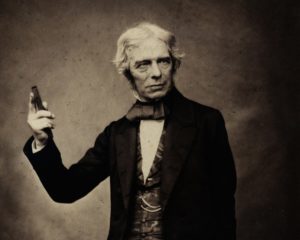
Michael Faraday (1791 – 1867) was a key figure in 19th century science whose work was critical in advancing our understanding of electricity and magnetism. His groundbreaking work and insights helped pave the path for future breakthroughs in the field of electromagnetism.
Faraday was born in London to a struggling family, but also one of strong spirituality. He began his education inside a church and developed a love for reading. A big break in Faraday’s life came when in 1812 he attended a series of chemical lectures by Sir Humphry Davy. Being a detailed oriented person, Faraday took meticulous notes at that fortuitous lecture and then mailed them to Davy in the form of a 300 page binder. Impressed with work and thanks to an accident to one of his assistants in his laboratory, Davy brought Faraday on as an assistant and opening of the doors of opportunity to science for him. He was able to study chemistry under Davy and quickly mastered the science of the day. He eventually obtained a position at the Royal Institution of Great Britain, became an expert in his own right in chemical analyses, discovering benzene in 1825, but Faraday’s most important contribution to science came in the field of electromagnetism.
In 1831 Faraday discovered electromagnetic induction – that a moving magnetic field produces electric current. This is significant because previously the only known way to produce an electric current was with a battery. But now electric current could also be produced by the movement of a magnet. This relationship was eventually modeled mathematically by James Clerk Maxwell.
Faraday continued to make important discoveries such as diamagnetism and established two laws of electrolysis, as well as give lectures at the Royal Institution until late in life. He died at the age of 75 in 1867 as one of the most respected scientists of his day, an achievement extremely remarkable considering his humble origins.